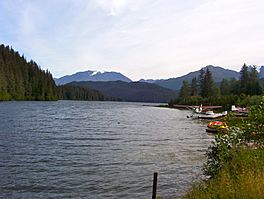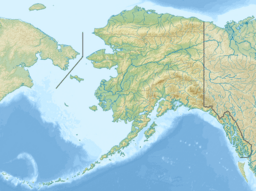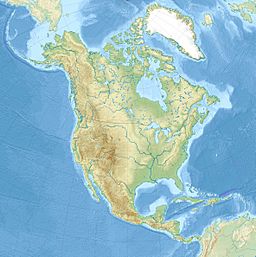Bear Lake (Alaska) facts for kids
Quick facts for kids Bear Lake |
|
|---|---|

Boat launch and floatplane dock on Old Sawmill Road
|
|
| Location | Kenai Peninsula Borough, Alaska |
| Coordinates | 60°12′03″N 149°21′11″W / 60.20083°N 149.35306°W |
| Primary inflows | Various minor streams |
| Primary outflows | Bear Creek |
| Basin countries | United States |
| Max. length | 1.2 mi (1.9 km) |
| Islands | 1 |
| Settlements | Bear Creek |
Bear Lake is a beautiful lake located in Alaska, near the town of Seward. It's part of the Kenai Peninsula, a large piece of land that sticks out into the ocean. You can easily reach the lake from Bear Creek Road, which connects to the main Seward Highway.
Contents
Discovering Bear Lake
Bear Lake is one of many lakes in Alaska with the same name. It's special because it's a very important place for salmon. People have been working here since 1962 to help salmon populations grow.
Where is Bear Lake Located?
Bear Lake is found in the Kenai Peninsula Borough in the U.S. state of Alaska. It is close to the town of Seward and Resurrection Bay. The lake is about 1.2 miles (1.9 km) long.
Helping Salmon Thrive at Bear Lake
Since 1962, Bear Lake has been a key location for "salmon enhancement." This means people work to make sure more salmon can live and grow here. The program is now managed by the Cook Inlet Aquaculture Association.
What is Salmon Enhancement?
Salmon enhancement is like giving salmon a helping hand. It involves different ways to increase the number of salmon in a lake or river. This can include raising young salmon in special places before releasing them. It also means making sure the salmon have a safe environment to live in.
Types of Salmon at Bear Lake
At Bear Lake, the main focus is on two types of salmon:
- Sockeye salmon: These salmon are known for their bright red color when they return to spawn.
- Coho salmon: Also called silver salmon, they are popular for fishing.
Protecting Young Salmon
One important part of the work at Bear Lake is controlling animals that might eat young salmon. These are called "predators." They also manage other fish that might compete with salmon for food. By doing this, more young salmon can survive and grow into adults. This helps keep the salmon population strong for the future.
Geological Insights from Bear Lake
Scientists study the area around Bear Lake to learn about Earth's past. The rocks and soil here, known as the Bear Lake Formation, give clues about what the environment was like millions of years ago during a time called the Miocene epoch.
 | Mary Eliza Mahoney |
 | Susie King Taylor |
 | Ida Gray |
 | Eliza Ann Grier |



